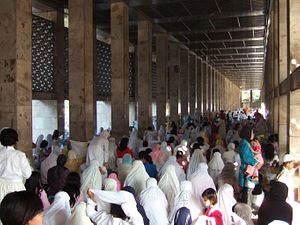The runup to Indonesia’s presidential elections next year has offered a brief quiet period in the past couple of weeks, relatively speaking. Both tickets are readying their campaign teams ahead of launching an electoral assault toward April. Nonetheless, that has not stopped the endless speculation about how candidates’ strategies have fared for them thus far.
One of the angles being explored is the extent to which religious issues are affecting the race. Already, cracks in incumbent President Joko Widodo’s base have appeared, with former supporters accusing the president of selling himself out as he cozies up with ultra-conservative political elements. Still, walking a moderate line has nonetheless served him well in the opening weeks of the campaign. Will that satisfy progressive voters?
One of the first substantial polls since the close of nominations in early August shows major supporters of the country’s major Muslim groups leaning as expected. Widodo has secured the support of a majority of members of Nahdlatul Ulama – the world’s largest Muslim body. Winning this group’s support was the extraordinarily transparent motivation behind selecting 75-year-old NU chair Ma’ruf Amin as Widodo’s vice presidential candidate; the 59 percent of respondents to the September 3 Y-Publica poll supporting the pairing shows it was a worthy investment. By comparison, the Subianto-Uno ticket won the support of just 23.3 percent of respondents.
Muhammadiyah, which trails NU with 50 million members, is largely in support of Subianto-Uno, but by a much thinner margin. Of those respondents, 42.7 percent favor the challengers, while the incumbent ticket is close behind with 39.9 percent support. This isn’t all that shocking, beyond NU and Muhammadiyah supporters rarely being on the same page politically. While Muhammadiyah counts Amien Rais, one of Jokowi’s most virulent detractors, among its elder statesmen, that has not at this stage influenced the membership base.
The same cannot be said of Islamic Defenders Front (FPI) members who, unsurprisingly, overwhelmingly back the Subianto-Uno ticket on 67.5 percent.
In June, Subianto and Rais visited the FPI’s exiled leader, Rizieq Shihab, in Saudi Arabia. When asked about the visit by media back in Jakarta, Gerindra Party deputy chairman Fadli Zon said the visit had been an impromptu one after the pair attended umrah. That would perhaps be easier to believe had Subianto not secured a very public endorsement from Shihab, who then also called on the opposition coalition to firm up its backing of Subianto as candidate.
The Widodo camp, via a cadre from backing party Indonesian Democratic Party of Struggle, vied for Shihab’s blessing earlier this year, with a visit also in Mecca. Pornography charges, which have kept Shihab in Saudi Arabia over fears he will be jailed upon return, were dropped in June, leading to speculation the president was looking to smooth over any enduring animosity between the administration and the FPI.
It is questionable exactly how much wider political influence the FPI retains, particularly beyond places such as the more conservative enclaves of West Java. A “reunion” on December 2 last year commemorating the largest of the pre-Jakarta gubernatorial election demonstrations was listless in its purpose given that Anies Baswedan had secured the governorship and Basuki “Ahok” Tjahaja Purnama has been imprisoned on blasphemy charges.
It is not clear if the FPI and other groups involved in the organization of those demonstrations will be able to reactivate those participants without a clearer goal beyond “make Subianto president.” The success of the anti-Ahok protests relied on the perceived existential threat to Islam. Attacks leveled against Widodo in the 2014 race were aimed at this, and included questioning his ancestry as ethnically Chinese and heavily implying his links to communism, but were clearly anticipated by the Widodo team in naming Amin as running mate.
In 2014, Subianto carried just five provinces – West Sumatra, Gorantalo, West Java, West Nusa Tenggara, and Banten. Among the most populous in the country as well as the most conservatively Muslim, the provinces could be said to be “natural” Subianto voters, so is it worth pandering at all? An August editorial published prior to the Amin announcement from Tempo magazine pondered why Widodo was “paying more attention to electoral considerations than to the interests of the people,” underlining that while the role of vice president is in itself not particularly powerful, it is important to ensure the second-in-charge could rise to the challenge if need be.
It’s a lofty question which will feature throughout the campaign. Widodo has shown he will go far to secure his power, even rubbing shoulders with political enemies. Will this strategy win over voters, or push them away?

































